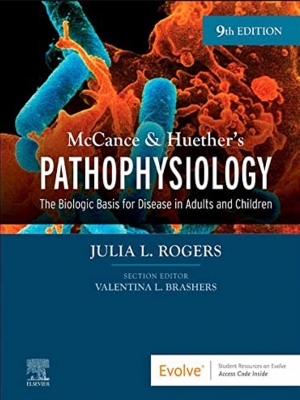Learn the what, how, and why of pathophysiology! With easy-to-read, in-depth descriptions of disease, disease etiology, and disease processes, McCance and Huether’s Pathophysiology: The Biologic Basis for Disease in Adults and Children, 9th Edition helps you understand the most important and most complex pathophysiology concepts. This updated text includes more than 1,300 full-color illustrations and photographs to make it easier to identify normal anatomy and physiology, as well as alterations of function. It’s the most comprehensive and authoritative pathophysiology text available!
New to this edition
Key Features
Table Of Contents
PART ONE: Central Concepts of Pathophysiology: Cells and Tissues
UNIT I The Cell
01 Cellular Biology
02 Altered Cellular and Tissue Biology: Environmental Agents
03 The Cellular Environment: Fluids and Electrolytes, Acids and Bases
UNIT II Genes and Gene-Environment Interaction
04 Genes and Genetic Diseases
05 Genes, Environment-Lifestyle, and Common Diseases
06 Epigenetics and Disease
UNIT III Mechanisms of Self-Defense
07 Innate Immunity: Inflammation and Wound Healing
08 Adaptive Immunity
09 Alterations in Immunity
10 Infection
11 Stress and Disease
UNIT IV Cellular Proliferation: Cancer
12 Cancer Biology
13 Cancer Epidemiology
14 Cancer in Children and Adolescents
UNIT V The Neurologic System
15 Structure and Function of the Neurologic System
16 Pain, Temperature Regulation, Sleep, and Sensory Function
Alterations in Cognitive Systems, Cerebral Hemodynamics, and Motor Function
18 Alterations of the Brain, Spinal Cord, and Peripheral Nerves
19 Neurobiology of Schizophrenia, Mood Disorders, Anxiety Disorders, Posttraumatic Stress Disorder, and Obsessive-Compulsive Disorder
20 Alterations of Neurologic Function in Children
UNIT VI The Endocrine System
21 Mechanisms of Hormonal Regulation
22 Alterations of Hormonal Regulation
23 Obesity, Starvation, and Anorexia of Aging
UNIT VII The Reproductive Systems
24 Structure and Function of the Reproductive Systems
25 Alterations of the Female Reproductive System
26 Alterations of the Male Reproductive System
27 Sexually Transmitted Infections
UNIT VIII The Hematologic System
28 Structure and Function of the Hematologic System
29 Alterations of Hematologic Function
30 Alterations of Hematologic Function in Children
UNIT IX The Cardiovascular and Lymphatic Systems
31 Structure and Function of the Cardiovascular and Lymphatic Systems
32 Alterations of Cardiovascular Function
33 Alterations of Cardiovascular Function in Children
UNIT X The Pulmonary System
34 Structure and Function of the Pulmonary System
35 Alterations of Pulmonary Function
36 Alterations of Pulmonary Function in Children
UNIT XI The Renal and Urologic Systems
37 Structure and Function of the Renal and Urologic Systems
38 Alterations of Renal and Urinary Tract Function
39 Alterations of Renal and Urinary Tract Function in Children
UNIT XII The Digestive System
40 Structure and Function of the Digestive System, 1285
41 Alterations of Digestive Function
42 Alterations of Digestive Function in Children
UNIT XIII The Musculoskeletal System
43 Structure and Function of the Musculoskeletal System
44 Alterations of Musculoskeletal Function
45 Alterations of Musculoskeletal Function in Children
UNIT XIV The Integumentary System
46 Structure, Function, and Disorders of the Integument
47 Alterations of the Integument in Children
UNIT XV Multiple Interacting Systems
48 Shock, Multiple Organ Dysfunction Syndrome, and Burns in Adults
49 Shock, Multiple Organ Dysfunction Syndrome, and Burns in Children
Glossary
Index


